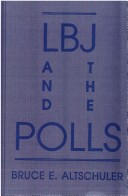Social sciences monograph
1 total work
no 77
Lyndon Baines Johnson was the first president to put a private polling firm on a regular retainer and to assign an aide to assess poll results. This original and significant monograph, for which Bruce Altschuler mines the rich archival lode at the Lydon B. Johnson Library, explores how the Johnson administration used polls and how polls affected major policy decisions. What emerges is the stuff from which high drama is made: how Lyndon Johnson and his staff welcomed poll results as long as the news was good, and wrestled with them when the news was bad - denying the polls' accuracy, discounting their importance, distorting their meaning, counterattacking with selective leaks of private polls, and finally staging events designed to influence the polls. In short, Johnson used polls less to inform himself about public disillusionment with Vietnam and the economy than to manipulate the press and politicians (and perhaps to delude himself) into believing that the public supported his politics.
Altschuler's conclusions refute some common misconceptions about polls-that, for instance, they offer an antidote to presidential isolation, that they diffuse the power of interest groups, and that poll results tend toward the conservative, favouring the status quo.
Altschuler's conclusions refute some common misconceptions about polls-that, for instance, they offer an antidote to presidential isolation, that they diffuse the power of interest groups, and that poll results tend toward the conservative, favouring the status quo.
